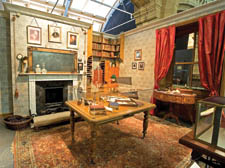|
|
 |
| |

One of the exhibits is a recreation of Darwin’s Downes House study |
How Charles Darwin challenged Genesis
The Natural History Museum is offering a lively insight into Darwin’s Big Idea that shook the world 150 years ago, writes Gerald Isaaman
WITH this flowing white beard and sad eyes, he looks like some old and unhappy Father Christmas.
The image of Charles Darwin most of us know does not match that of the adventurous young man who set off on HMS Beagle in a five-year marathon voyage of exploration around the world.
You will have to visit the major exhibition at the Natural History Museum, which celebrates the 200th anniversary of his birth in February, to appreciate the challenge he took on and the overwhelming volume of work he did when confronted with strange plants and creatures never seen before.
We all know the immaculate result of his adventure – and the controversial birth of his Big Idea of natural selection – but the scale and scope of it truly come home once you step into the darkened realms of the display.
It gives a clue to the jungles he penetrated, bird and wave-splashing sounds adding to the atmosphere of the exhibition and its displays of not only fabulous fossilised animals but live green iguanas and horned frogs from far off South America as well.
They help you trace the story of a man with a mission, as do the two mockingbird specimens Darwin, just 21 when he set out in 1831, brought back from San Cristobal island. They are the very first exhibits, lying on their backs, feet pointing upwards, as if only temporarily asleep.
You can almost feel his hand on history, viewing the bugs and beetles and butterflies he collected, the fossils and the finches, giant tortoises, reptiles and skeletal fish amid plants not seen before.
Plus there’s the original extracts from his diaries and notes on the new world he recorded in such detail, and which provided the evidence for his evolutionary theory, which had to wait until 1859 before it went into print.
That, of course, is the big controversy over his big idea and whether his rival, Alfred Russel Wallace, should share in the honours. It is an old argument that persists with those like John Herschel, who thought Darwin’s theory “the law of higgledy piggledy”.
The coming year will be as packed with Darwin events and excitement as this excellent exhibition, which also includes more intimate aspects of Darwin’s life, such as a reconstruction of his study and even some of his white whiskers.
The only annoying aspect is that the overhead shafts of light too often create shadows over the exhibits and make using the tiny display microscopes difficult.
But any shadows here are more than obliterated by the shaft of enlightenment that Darwin created and for which he is being duly remembered.
•
|

|
 |
|
 |
|

